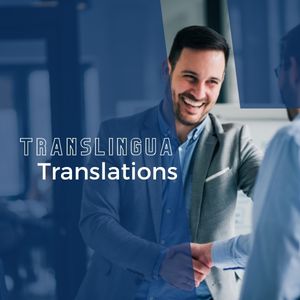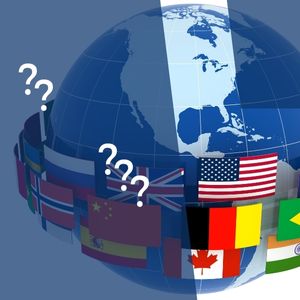Human Language Translation Service
Since 1980 providing Human Language Translation Service in USA
ATA Certified Translators and Professional Editors
Translingua is proud to be a 100% human language translation service. We have a team of human translators who can handle your translation project for any language or dialect spoken worldwide. We refuse to use machine-based artificial intelligence (AI) software programs that are horribly inept at retaining the accuracy and integrity of a translated document. Our teams consist of:
Native-speaking certified linguists specialized in the relevant industrial subject matter are needed for the task.
Native-speaking professional editors with expertise in the subject matter and extensive knowledge of the target language.
Experienced proofreaders that analyze your document to ensure it is complete and correct before returning it to you.
Our certified translators and editors use a database of approved terms and sentences that they created and maintain. This makes the translation process efficient and consistent throughout each file. Why is a human language translation service so important? We will talk about the issues with machine translation services and explain why no language translation company should use them.
Problems with Machine Translation
Machine Language Translation began in the 1950s. Researchers in the US, Europe, and Russia developed algorithms for translating words between languages. Almost 70 years later, a litany of problems with machine translation still exist.
The most significant of all problems with machine translation is contextual quality. Consider this:
Based on the context in which the word is used, the hundreds of thousands of words in any language can have various meanings. A machine translation program cannot take context into account. Complex sentences, paragraphs, and entire pages exponentially compound this problem. A human language translator can understand the meaning of words and how they are used in sentences, paragraphs, and pages.
A translation service can understand and recreate the cultural, emotional, and communicative meaning of your original documents in the translated documents. The documents read as though someone never translated them from one language to another in the first place.
Other Machine Language Translation Problems
A lack of contextual understanding is only one of several machine language translation problems. Other machine language translation problems include:

Lack of cultural sensitivity
Understanding the values and norms of the culture for which a document is being translated is essential. Not understanding can lead to accidentally sending the wrong message, which can harm relationships in business and society.

Causing more human work
Some translation companies use AI software to begin projects because they believe this saves time. However, it actually requires more time to correct contextual errors. Plus, if a translator misses those errors, the result can be culturally catastrophic.

It sounds like a computer
Language is a creative expression. Machine translations cannot be innovative or creative. The target documents end up sounding and feeling impersonal and inhuman, just like the AI software that translated them.
Choosing human language translator services negates problems with machine translation. A language translator is both a scientist and artist, as they have mastered translation precision and the art of communication. At Translingua, our translators are native speakers of the target languages, so they understand cultural and communicative contexts. The result is a culturally appropriate, efficiently composed and psychologically engaging document on a human emotional level.

Case Study: Google Translation Services and Wikipedia
Wikipedia has a big problem with machine language translation due to Google Translation Services causing issues. Although Wikipedia is globally accessible, it is still heavily English-based. 15 out of 301 foreign language editions on the site have over one million articles for non-English speakers. The site has a total of 5.5 million articles.
In early 2019, Wikipedia turned to Google Translation Services for help. Google is the most widely used machine translation tool in the world currently. However, things quickly went awry. In an article about water delivery to villages, Google translated “village pump” to “bomb the village” in Portuguese.
Wikipedia has made special admin rules to block or reverse recent machine translations due to numerous issues. The Indonesian Wikipedia community wants Google Translation Services to be permanently removed from Wikipedia because it causes many problems.
Machines have been able to translate words between languages for 70 years. However, they are still far from being as good as a skilled human translator. and they might not get any closer in our lifetimes. According to a Wiki Administrator named Vermont, machine translation will never work for creating Wikipedia articles.
Translingua Human Language Translator Services
Since 1976, Translingua has offered accurate and ethical translation services in over 6500 languages worldwide. In this time, we have learned a few things:
First, linguistic context is just too important to trust to a machine. Second, proper translation is just too difficult to trust to anyone other than certified translators and industry experts. A skilled human translator is better and faster than a mediocre translator with faulty machine software.
These first-hand understandings translate to increased satisfaction and cost savings for our clients in both the short and long-term. Contact us to obtain a free quote, or to learn more about how Translingua’s human language translator services can benefit you.

FAQ
A. Translingua Translations can check if the document you want translated can be done well and delivered on the same day. We value quality work at all circumstances over the speed of our work, for your utmost satisfaction as well.
A. Through human translation, you will ensure that your document is consistent, correct and accurate. Machine translations have not perfected everything yet, but they struggle with things like cultures, traditions, context, and more. Our expert linguists will guarantee you 100% high-quality, content aware translations for your documents.
A. Human translation is the act of a person translating text using their own intelligence. It involves not relying on a machine to convert words from one language to another.
